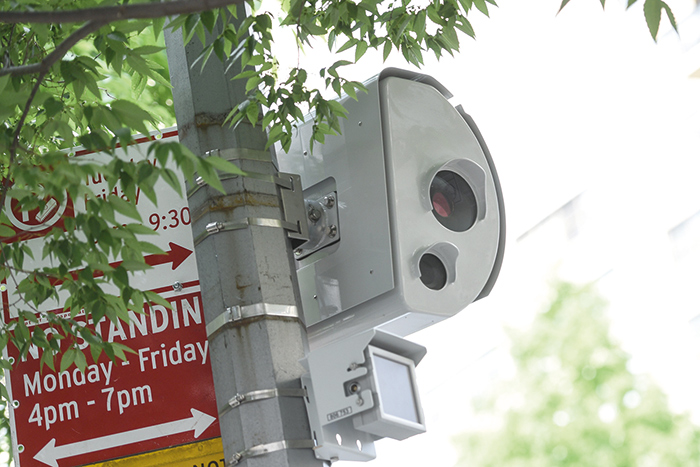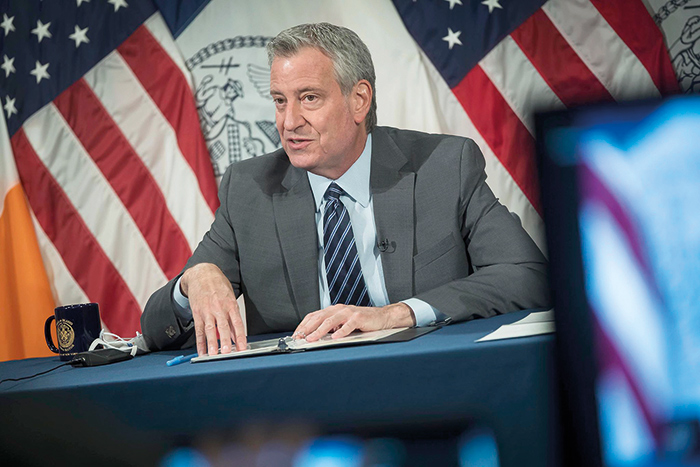Photo Courtesy of Ed Reed/Mayoral Photography Office
“A recovery for all of us starts by investing in working families across New York City. The pandemic hit us hard but together we will fight back and drive a recovery in every neighborhood,” Mayor de Blasio said.
By Forum Staff
Mayor Bill de Blasio on Monday presented the Recovery Budget, New York City’s $98.6 billion Executive Budget for Fiscal Year 2022.
“A recovery for all of us starts by investing in working families across New York City. The pandemic hit us hard but together we will fight back and drive a recovery in every neighborhood,” de Blasio said. “We are meeting the moment with direct investments in education, small businesses, open space and public health, and we are building up reserves to continue our strong fiscal foundation for the future. With the Recovery Budget, New York City will emerge from this challenge stronger, fairer, cleaner, greener and safer than ever.”
Highlights of the Executive Budget include:
- 100 percent Fair Student Funding for schools: $600M in FY22
- Universal Free 3-K For All to make 3K available for every family by September 2023: $377M in FY22
- Intensive Academic Recovery for Every Student to establish baselines with assessment data, core ELA & Math instruction, tutoring, and teacher planning time: $500M in FY22
- Increase Information Technology Support, including digital tools that support technology literacy for every student: $155M in FY22
- Hold Schools Harmless for Mid-Year Adjustments: $130M in FY21
- Expansion of Restorative Justice for Social Emotional Learning at Middle and High Schools: $12M in FY22
- Community Schools in Every District by expanding from 266 to 406 community schools citywide: $10M in FY22
- Public Schools Athletic League (PSAL) expansion to increase access to sports programming across the city for high school students, focusing on schools with greatest need: $6M in FY22
- Strengthening Special Education Services including counseling, physical and speech therapy: $236M in FY22
- Expanding Early Childhood Special Education: $22M in FY22
- Summer Rising for up to 190,000 young people this summer: $200M in FY22
- Add 5,000 CUNY Summer Youth Employment slots to bring the total to 75,000 slots: $13M for a total investment of $167M in FY22
- Launch NYC Public Health Corps: $50M in FY22
- Launch New Family Home Visits, health Services to first-time parents in Task Force Neighborhoods and for NYCHA residents: $23M in FY22
- Expand LifeSci NYC Initiative beyond Life Science Avenue (Manhattan’s East Side) to include the Bronx, Brooklyn and Manhattan’s West Side and increase lab space across NYC: $300M in capital
- Better prepare for next health emergency with focus on health inequities with the Pandemic Response Institute: $20M in capital
- Bring Mental Health Crisis Response Citywide, including EMS and social worker teams for urgent non-violent mental health needs: $112M in FY22
- Expand Mobile Treatment Teams by adding 25 new teams to bring critical mental health services directly to New Yorkers: $23M in FY22
- Thrive Neighborhood Support Network, adding crisis prevention support by peers and community organizations: $2.5M in FY22
- Launch Communities Thrive to connect underserved New Yorkers with tele-mental health services: $2M in FY22
- Create the Behavioral Health Academy to train and support community mental health providers in areas hardest by the pandemic: $1M in FY22
- Launch Community Care Plan to support seniors living at home and in their communities and open 25 more senior centers in underserved communities of color: $39.4M in FY22
- Invest more in existing senior centers: $10M FY22
- Provide financial stability for human services providers by increasing indirect rates: $120M in FY 21-22
- Expand emergency food distribution programs including delivery of fresh produce and shelf-stable goods to pantries and community-based organizations: $32M FY22
- Small Businesses Rental Assistance and Grants for Low/Moderate Income Neighborhoods: $100M in FY22
- Low-Interest Loans for Small Businesses Hit by Pandemic: $30M in FY21 to leverage $70M private investment
- Commercial Lease Legal assistance in underserved neighborhoods: $5.2M in FY22
- Launch Largest Tourism Campaign in History with NYC&Co: $25M in FY22
- City Clean Up Corps to directly hire 10,000 New Yorkers to make the city cleaner and greener: $234M FY22
- Resume organics collection and expand recycling programs: $33M in FY22
- Restore litter basket collection service: $9M in FY22
- Funding for operations and maintenance of 360 speed cameras in FY21 and 600 speed cameras in FY22, bringing total to 2,220 cameras citywide: $46M in FY22
- Investing to streamline process for Open Restaurants: $8.5M in FY22
- Community Support for Open Streets: $4M FY22
- Bike Boulevards, Brooklyn Bridge bike lane: $2M between FY21-22
- Queensboro Bridge bike lane: $5M in capital
- Complete the Manhattan Greenway: $723M in capital
- CCRB expansion including enhancements launch of CCRB biased-based investigation capacity: $4.1M in FY22
- Community-Based Hate Crime Prevention for community based organizations to lead neighborhood patrols, do bystander intervention training and provide victim services: $3M in FY22
- Cure Violence – double workforce then triple workforce, add two new sites, and increase Anti-Violence Youth Employment: $27M in FY22
- Advance Peace to connect mentors with at-risk youth: $6M in FY22
- Saturday Night Lights will expand to 100 Locations: $7M in FY22

Photo Courtesy of Michael Appleton/Mayoral Photography Office
Among the highlights of the Recovery Budget is funding for operations and maintenance of 360 speed cameras in FY21 and 600 speed cameras in FY22, bringing total to 2,220 cameras citywide.
“As we emerge from this pandemic, we have an opportunity to rebuild our economy to be stronger and more equitable. In February, I urged the Mayor to strategically use stimulus funds to help families who are still struggling through this pandemic, and to give our economy the shot in the arm it needs to bring back jobs for the hundreds of thousands of New Yorkers who are still without one,” City Comptroller Scott Stringer said.
“The mayor’s budget includes several important investments in schools, small businesses, and violence prevention. I am pleased that the budget restores cuts to essential services and fulfills indirect cost obligations to nonprofits, as I have long advocated for.
“We must also remember that stimulus funding is temporary—and that even when our economic recovery is fully underway, we still face substantial budget gaps. We need a sustainable budget plan for the post-pandemic era that protects New Yorkers and safeguards our fiscal future.
“I look forward to reviewing this budget in full and ensuring that it delivers for all New Yorkers, jumpstarts our economic recovery, and lays the groundwork for a new, fairer economy.”

